-
032023. 03
No. 204 View. 95806
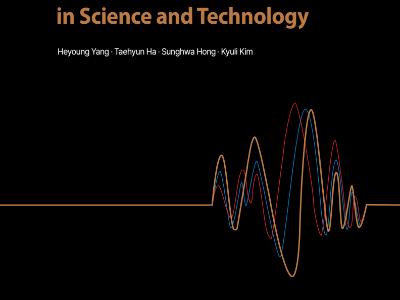
Signals of the Future Detected by Artificial Intelligence
Signals of the Future Detected by Artificial Intelligence - KISTI publishes “Emerging Weak Signals 2023 in Science and Technology” - Following the release of its Weak Signals in Future Technology report and Forecast Report on Weak Signals in Future Technology in Korean last year, the Korea Institute of Science and Technology Information (President Kim Jaesoo, hereinafter KISTI) has published Emerging Weak Signals 2023 in Science and Technology, and English report on weak signals in science and technology with future potential detected using artificial intelligence. KISTI developed and released the findings on automated weak signal detection technology which uses data and algorithms to detect early signs of technology with potential for future growth last year. Weak signals- signals containing information about the future even though their significance remains yet to be seen in the present, are one way to explore technologies with potential for future growth. With technological hegemony and economic recession intensifying globally, it is imperative to swiftly and accurately detect early signs of future technologies to actively establish a nation’s strategy for the future that hastens technological innovation and ensures autonomy in future technologies. In response to such demands of the times, KISTI has released the Emerging Weak Signals 2023 in Science and Technology report presenting 439 weak signals in 24 fields of science and technology, which were detected using its independenly developed automated weak signal detection technology. This is a quantitative increase from the 391 weak signals detected in the previous year. Also presented in the same report are findings on weak signal dynamics, comparing and analyzing changes and trends between weak signals in this report and those detected previously. The specific data presented are newborn weak signals appearing for the first time, weak signals that remained unchanged in the span of a year, and weak signals that were largely the same but partially changed in content from the previous year. Weak signal dynamics research will empower a more accurate understanding of the specific qualities of technologies with future potential, facilitating the establishment of a strategy on future technologies. The automated weak signal detection technology developed by KISTI monitors global innovation trends such as the accelerating digital transformation and changing technological and industrial ecosystems in real time, presenting information swiftly and accurately to enable continous horizon scanning※ for understanding the future. It is hoped that the technology will provide digital insights to a wide range of entities performing research on technology innovation. ※ Horizon scanning - A systematic methodology for detecting early signs and trends in new technologies and social issues that could potentially become threats or opportunities with great influence in the future - Conventionally utilizes expert discussions and qualitative analysis, but attempts to use big data and AI analysis have been growing recently - Horizon scanning is a necessary step in predicting the future and shaping policy, widely utilized in the EU, UK, U.S. and the OECD -
292022. 07
No. 203 View. 127013
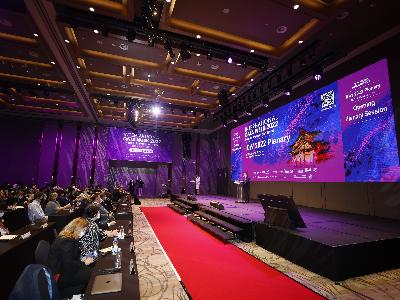
IDW 2022 & Open Science Workshop completed successfully
IDW 2022 & Open Science Workshop completed successfully - Strengthening international cooperation of open data-based R&D - KISTI hosted the world's largest data conference, International Data Week 2022 and co-events, under the theme of 'Data which is for better world making' on Seoul Dragon City Hotel from June 20th to 24th. IDW 2022 was a joint holding event to open & share research data with international organizations of data such as, Committee on Data(CODATA) which is an affiliated organization of International Science Council(ISC), World Data System(WDS), Research Data Alliance(RDA) which is the world's biggest research data initiative. And also KISTI, Korea Institute of Geoscience and Mineral Resources(KIGAM), Korea Institute of Oriental Medicine(KIOM), Korea Research Institute of Standards and Science(KRISS), National Library of Korea, and SungKyunKwan University(SKKU) hosted jointly. Furthermore for a successful hosting, Korean Ministry of Science and ICT, Korean Ministry of Culture, Sports, and Tourism, Seoul Metropolitan Government, National Research Council of Science & Technology of Korea, Korean National Commission for UNESCO and Korea Tourism Organization sponsored. For this event, a large number of experts and notables from data-related international organizations, Seoul Metropolitan Government, National Assembly of the Republic of Korea, research institutes, libraries, universities, and companies participated. This proves the advent of the era of data economy that affects not only S&T fields but also all fields, with an importance of data. 827 people(216 Koreans and 611 foreigners) who are data sharing-utilization researchers, enterprisers, policy experts, data scientists and data managers from 50 countries of all over the world(13 Asian countries, 20 European countries, 5 African countries, 2 North American countries, 4 South American countries, 2 Oceania countries, 4 Middle Eastern countries) attended the event online & offline. IDW 2022 was consisted of 139 sessions for 5 days: ▲8 plenary sessions under the theme of 'Data which is for better world making', ▲19th RDA plenary meeting's 73 sessions under the theme of 'Global infrastructure development and support to promote data sharing and re-use', ▲47 sessions of SciDataCon 2022 about the issues related research data, ▲KISTI Open Science Workshop and such 7 co-hosted events and 4 poster sessions. And there were various and meaningful discussions to share understanding the importance of Open data & its sharing in the Open Science era, by presentations of data policies and cases. Also KISTI had a meeting to enhance global cooperations with CODATA and ORCID in this week. Barend Mons, president of CODATA said, "We would like to ask for the role and support of KISTI as a representative organization of CODATA Korea.". Ivo Wijnbergen, manager of ORCID said, "We hope to find collaboration in promoting Open Data by linking KISTI's DataON and ORCID ID.". In the plenary session under the theme of 'Global State of Open Science', Choi Kwang-nam, director general of KISTI National S&T Data Division introduced all over the world's data experts a status of Open Science in Korea and KISTI, and a policy trend of Open Science in Korea. Furthermore he showed KISTI's platforms: AccessON, DataON, ScienceON, that can show a competitiveness of KISTI. On the 24th(Fri.), the last day of IDW 2022, KISTI held a one of co-event 'Open Science Workshop'. It aimed forming the understanding and consensus among Open Science stakeholders, and spreading the base of Open Science. The workshop became a place to share a status of national open science and cases to innovate S&T for the future. Industries-academia-research institutes participated online and offline, and its programs were ▲Open Science system·policy status and issues, ▲Direction of big data development through Open Access and Open Data, and ▲Open cooperation for an achievement of Open Science. In the 3 sessions, there were presentations and discussions of the current status and cases. Kim Jae-soo, president of KISTI said, "In IDW 2022 and Open Science Workshop, KISTI got a leading international position of data-driven R&D field by confirmation a capability of developing and supporting global infrastructure to promote data sharing and re-use. And with OECD and UNESCO, we could also lead Open Science by enhancing open data-based global R&D cooperation.". -
112022. 07
No. 202 View. 131723
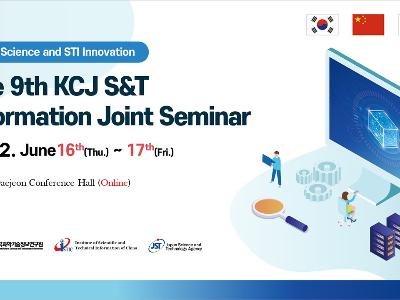
KISTI hosted the 9th Korea-China-Japan S&T information joint seminar
KISTI hosted the 9th Korea-China-Japan S&T information joint seminar - For 2 days online seminar from June 16th to 17th - - Representative information research institutes'(KISTI, ISTIC, JST) experts attended from those 3 nations - KISTI held 'The 9th Korea-China-Japan S&T Information Joint Seminar' from June 16th to 17th with those 3 nations representative information research institutes under the theme of 'Open Science and STI Innovation'. The Korea-China-Japan STI joint seminar took place from 2010, and has been co-hosted by KISTI, Institute of Scientific and Technical Information of China(ISTIC) and Japan Science and Technology Agency(JST). The purpose of this seminar is to share technologies and case reports for managing data efficiently which is the core value of S&T competitiveness and building a data open&share ecosystem, among those 3 institutes' researchers. Kim Jae-soo, president of KISTI appreciated to KISTI's 60th anniversary congratulations from ISTIC and JST, and hopefully said, "We will play a leading role in the field of STI through the cooperations with overseas research institutes.". Zhao Zhiyun, president of ISTIC and Koda Akira, vice president of JST sent greeting messages to state that they will co-work each other for promoting those 3 nations' friendship and establishing a cooperation system among the nations through an international interaction in data field. Nam Eun-kyung, senior engineer from Open Access Center of KISTI presentated about AccessON which is operated by KISTI as a national open access platform. In this seminar, researchers from the 3 institutes' shared knowledge and information about 4 themes of ▲ Open Science ▲ S&T Information Service ▲ STI Analysis Platform ▲ STI Cooperation and Innovation. KISTI focused on the latest content of DX innovation and STI cooperation, JST importantly introduced researches related to Open Science, and ISTIC showed high interest in the latest technologies and knowledge organizations about information service. Lee Hye-jin, director of Digital Curation Center of KISTI said, "Our plan is to establish an intelligent STI curation system and strengthen international cooperations for the digital transformation of the S&T information construction-sharing system through leading data standardization and intelligent technology development. This seminar will be a new starting point for global R&D cooperation and the DX.". -
072022. 07
No. 201 View. 134172
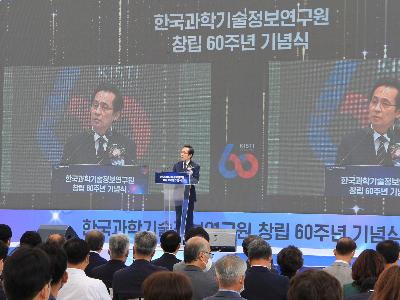
KISTI held a 60th anniversary ceremony of its foundation
KISTI held a 60th anniversary ceremony of its foundation - Chief Data Officer/Organization(CDO) which leads DX with national S&T data - KISTI held a ceremony of the 60th anniversary of its foundation at KISTI Daejeon HQ on June 9th. KISTI, which began as Korea Science & Technology Information Center(KORSTIC) in 1962, was launched in 2001 by integrating Korea Institute of Industry and Technology Information(KINITI) and Korea Research & Development Information Center(KORDIC). At the day, Oh Tae-Seog, the 1st vice minister of Korean Ministry of Science and ICT, Lee Sang-Min, the national assembly member of Korea, and Kim Bok-chul, the chairperson of National Research Council of Science & Technology of Korea, attended the ceremony. Starting with the DDS(Document Delivery Service) in 1962, KISTI has laid the foundation for the establishment of a national S&T data platform, including the Korea's first online information retrieval service in 1978 and the implementation of Hangeul(Korean language) searching service in 1985. In addition, regional information centers were built near the seats of city halls and provincial governments to promote a business supporting. In 1988, KISTI introduced the National Supercomputer No. 1(Cray), and also in the same year, the KREONET, a national S&T research network, was established to set a infrastructure for the R&D cooperation beyond the constraint of space. From 2001, KISTI was selected as an institute dedicated to establish a management and distribution system for S&T information, and in 2005, KISTI opened a network-based information protect service and expanded its cyber security infrastructure through the forming of Science and Technology Cyber Security Center to secure the security of goverment-funded institutes. In addition, it was appointed as a general managing institute of National Science & Technology Information Service(NTIS) in the same year. Through this, KISTI could integrate, manage and serve the national R&D data from all ministries. NTIS was awarded UN Public Service Award in 2012, and it also was exported its technology to Costa Rica to build their own R&D management system. In 2009, Association of Science and Technology Information(ASTI) was launched to construct an industry-academia-institute knowledge ecosystem for supporting regional SMEs which is suffering to commercialize R&D technologies. As of december 2021, ASTI had 15 regional organizations under a nationwide one and about 13,000 members. And they held a national conference and knowledge forums every year. In the DX era, KISTI also has been promoting a DX-ASTI strategy for supporting all ASTI members' digital transformation. Also in 2018, KISTI introduced the 5th national supercomputer, NURION to provide world-class supercomputing infrastructure for Korean researchers. On the other hand, for strengthening S&T data platform system, S&T knowledge infrastructure service(ScienceON), national research data platform(DataON), national open access platform(AccessON) was built. Through this, KISTI has been solidifying its position as the CDO. In the era of DX, KISTI is linking and cooperating S&T data, supercomputing, and intelligent information analysis infrastructure through the STI ecosystem which is established over 60 years. With constructing a S&T data dam, KISTI set a foundation for the AI linking and convergence of S&T knowledge resources. Also KISTI is leading the change of R&D trends in S&T DX for transition to digital economy through the establishment of quantum cryptographic network infrastructure and the cloud transformation of S&T information service. In addition, KISTI use the data to solve national pending issues like early flood warning, fine dust reduction, public transportation optimization and earthquake damage prediction. Moreover KISTI is driving the development of future agricultural data farms, global supply chain monitoring, and audio data utilization technology. At this day, Oh Tae-Seog, the 1st vice minister of Korean Ministry of Science and ICT praised efforts and achievements during 60 years and said, "KISTI, which has accumulated capabilities in S&T data and digital platform field, has to play a key role in leading S&T innovation and the digital transformation." Kim Jae-soo, president of KISTI said, "From the foundation of 1962, the ultimate goal of KISTI is to make Korea a world power through S&T innovation. As a national research institute of S&T data, KISTI will contribute to strengthen the S&T hegemonic competitiveness of Korea through opening the open science era, developing global super-gap computing technology, establishing intelligent data convergence analysis system and supporting S&T DX. We will do our best to promote the happiness of people and serve as a key institute of national S&T research beyond future 100 years." -
042022. 05
No. 200 View. 141516
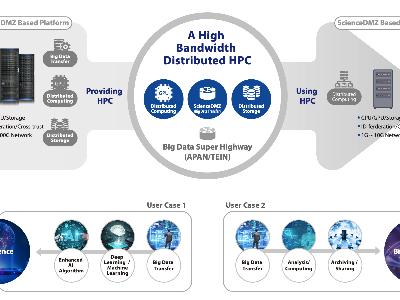
KISTI will commence the Asian BigData Superhighway computing infrastructure buil...
KISTI will commence the Asian BigData Superhighway computing infrastructure building project - Providing high bandwidth distributed HPC resources to developing countries which need Asia S&T infrastructure - Asi@Connect/TEIN*CC project provides a high bandwidth distributed HPC environment through an establishment of ScienceDMZ, the Asian BigData Superhighway system, and plays a leading role in improving international competitiveness by advancing insufficient IT resources and infrastructure systems in Asia. KISTI announced that it was selected as the organizer of Asi@Connect/TEIN*CC which is a remote providing project of distributed HPC resources. So that KISTI will start the project to build international research network superhighway with Australia, Malaysia, and Pakistan. Asi@Connect is a representative Asia-Europe multilateral cooperation project that enhances research networks between the two continents by connecting with a Trans Eurasia Information Network(TEIN). Also the project's name was called from 2016 as Asi@Connect. This project manages/supports network infrastructure that rapidly transmits large-scale S&T data such as telehealth, distance education, Eduroam*, and climate risk/disaster management research. Also it supports the establishment of research networks in Asia and its developing countries and bridge the information gap between regions. The project is operated with EU-centered finances and contributions from member countries. * Eduroam(Education Roaming): Global Wi-Fi roaming service for research and education in higher education This project applies intercontinental high-speed bigdata transmission technology through the ScienceDMZ*-based Korea Research Platform developed and operated by KISTI to four Asian countries, including Korea, Australia, Malaysia, and Pakistan. And with this base, it provides distributed computing resources-linked HPC environment to Asian developing countries for attempting an HPC-driven applied research. In the future, KISTI's 5th national supercomputer Nurion's resources will also be linked and utilized. * ScienceDMZ: A networking technology for high-speed transmission of big data, and it awarded by the Ministry of Science and ICT of Korea as one of the top 100 R&D researches(2020) Malaysia and Pakistan, which are selected beneficiary countries of the Asi@Connect, commented they will receive data and HPC resources for bio/AI research through the high-speed transmission infrastructure and high-performance distributed computing platform that will be built by the project. KISTI has led the APRP Working Group*, which studies the Asia-Pacific research platform for a joint research on high-speed networking technology with Asian countries. Through this selected project, the existing research level will be applied to 4 countries, so that the research level will be improved to the realization stage. Also KISTI will play a role in enhancing the global status of the Korean S&T research network. * APRP(Asia-Pacific Research Platform) Working Group: Asian countries-centered non-profit research cooperation for high-speed network-based high-performance platform technology Moon Jeong-hoon, chair of APRP Working Group said, "This project provides the insufficient HPC resources in Asian developing countries, while promotes technology cooperation, through the combining high-speed networking technology and distributed computing technology. Accordingly the project will play a role to enhance the IT field leadership of Korea." -
222022. 04
No. 199 View. 147556
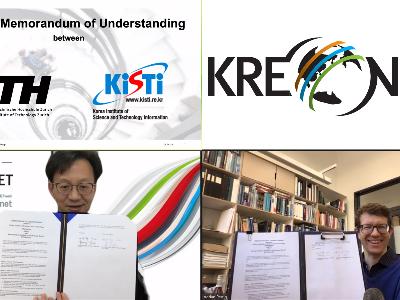
KISTI & ETH Zürich combine forces to build and develop the world's 1st high-secu...
KISTI & ETH Zürich combine forces to build and develop the world's 1st high-security research core network - KISTI & ETH Zürich signed a MoU - Dr. Cho Bu-seung, director of KREONET Center, KISTI, and Prof. Dr. Adrian Perrig, department of Computer Science, ETH Zürich On April 4th, KISTI and ETH Zürich signed a MoU online to build and develop the world's 1st high-security research core network which overcame IP/BGP*-based network problem through SCION** technology, a next-generation internet architecture. *SCION(Scalability, Control, and Isolation On Next-Generation Networks) : A future internet architecture developed by the SCION team of Network Security Group, ETH Zürich which is led by Prof. Adrian Perrig. And it has dramatically enhanced a security to solve existing internet security issues, so that currently it is used by more than 7 ISPs incluidng the Swiss National Bank(SNB). ** BGP(Border Gateway Protocol) : A gateway protocol to exchange routing information between autonomous systems(AS) for connecting different networks. KISTI's national research network, KREONET has been promoting a cooperation with Network Security Group of ETH Zürich from 2017. And from this year, through a full discussion, KREONET will work together as representing Asia with the European data network GEANT and the United States network consortium Internet2 to establish a SCION-based global research core network which is more secure than the existing internet. KREONET is a world-class national research network that can transmit large-scale research data in the field of big science and convergence research at high-speed. Through the MoU, it can be expected that a collaboration about constructing a SCION-based secure S&T research network backbone, obtaining testbeds for verifying the future internet architecture technology and building the world's 1st high-security research core network as the Asian representation research network. Cho Bu-seung, director of KREONET Center said, "This cooperation with the SCION team of ETH Zürich will strengthen collaborations for that not only establishing a SCION-based secure research network backbone service but also practical researches about a SCION-driven carbon neutral next-generation networking technology." Also Prof. Adrian Perrig who lead the SCION project said, "KISTI is a pioneering research institute in networking, and KREONET is a representative national research network in Asia. We are very excited to collaborate with KISTI to build the world's first high-security research network." -
072022. 04
No. 198 View. 120193
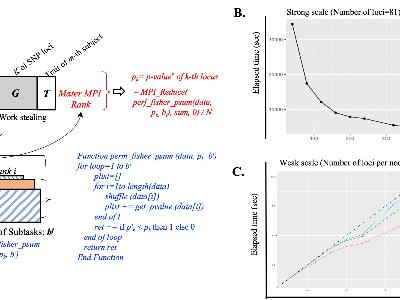
KISTI achieves Parallelization of world-class Genome Wide Association Study(GWAS...
KISTI achieves Parallelization of world-class Genome Wide Association Study(GWAS)- Optimization of Genome Wide Association Study's statistical error correction through parallel computing - A. Summary of the MPI-GWAS algorithm: Simultaneous/parallel analysis through MPI-Rank for quick calculation of N-Permutations B-C. Performance evaluation results: (B) Decrease in overall elapsed time by increasing parallel processing nodes(C) Expandability of elapsed time as simultaneous increasing with parallel processing nodes and data KISTI announced that it has developed a large-scale supercomputing software to correct statistical errors* in Genome Wide Association Study(GWAS). * It refers to a phenomenon in which the statistical significance calculation result through the large-scale GWAS is reported as false-positive. Representative cases of false-positive in the field of GWAS are that genetic mutations with low posibility of a genetic disease are reported to be highly related to the disease. Using the SW developed at Nurion, KISTI's 5th National Supercomputer, genetic mutations related to diabetes and high blood pressure from repoted 84,295 genetic mutations in 7,523 Korean cohorts and 4,242 British cohorts, were derived through GWAS calculations, and corrected those statistical errors by performing up to 7 billion random permutations. The supercomputing simulation SW can accelerate calculations by more than 300% compared to existing statistical programs through using up to 2,500 nodes* of Nurion. * It is capable of performing about 7.5 petaflops (1 petaflops = 1,000 trillion instructions per second) and accounts for about 25% of the performance of Nurion. The results of the GWAS analysis aim to select phenotype variation(disease or fruit weight, etc.), and the discovery of significant disease-related genetic mutaions is considered an important indicator of personalized health care and new varieties improvement in agriculture. Therefore, statistical error correction of GWAS results is essential. The statistical error correction of GWAS remained a challenge in the field because of its vast calculation. KISTI confirmed that it is possible to correct the existing errors by large-scale supercomputing-based petaflops-class calculating through parallel computing technology. Using Nurion, KISTI performed on GWAS with the world-class resources(7.5 petaflops). Dr. Kwon Oh-kyung and Dr. Paik Hyo-jung said, "This GWAS parallelization SW has been released its source code*, so that various genetic researchers can freely use it. We are expecting a research efficiency using supercomputer in the genetic field." Its research was published on March 31st in Genomics & Informatics**. * https://github.com/hypaik/proj_MPIGWAS ** Paik et al, MPI-GWAS: a supercomputing-aid permutation approach for genome-wide association studies Jeong Min-joong, director of Supercomputing Application Center said, "KISTI supports optimal parallelization* technology and computational resources for supercomputer users who need large-scale calculation. We expect that the distributed supercomputing simulation software will provide the research efficiency in the bio and medical fields." * Optimal parallelization is a technology that solves difficult problems by developing code that allows thousands of CPUs to perform simultaneously on supercomputer. -
062022. 04
No. 197 View. 164496
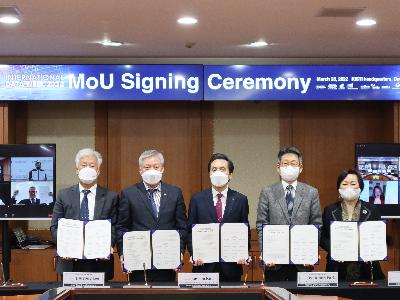
KISTI signed a MoU for a successful hosting of IDW 2022
KISTI signed a MoU for a successful hosting of IDW 2022 - Cooperation to hold the world's largest conference for opening and utilizing research data - KISTI held a MoU signing ceremony at the KISTI Daejeon Headquarters on March 28th, with research data-related international/domestic organizations to successfully host the world's largest conference, International Data Week 2022 (IDW 2022). IDW 2022 is a joint holding event to share research data with CODATA*, RDA**, and WDS***. * Committee on Data(CODATA) which is established by International Science Council(ISC) ** Research Data Alliance(RDA) *** World Data System(WDS) which is an affiliated organization of ISC IDW 2022 was scheduled to be co-hosted in South Korea on Nov. 2021, but it was postponed due to global pandemic situations and will be held in Dragon City, Seoul, South Korea for seven days from June 18th, 2022. In IDW 2022, people will discuss the data innovation ecosystem that promotes social contribution with new scientific discoveries in accordance with the recent data research paradigm, "Open Data and Utilization", also CODATA and WDS will jointly organize the research data conference "SciDataCon 2022" that for about 1,000 research data experts will be participate from 66 countries. The signing ceremony is aimed at promoting cooperation for the successful hosting of IDW 2022, sharing/utilizing research data, and creating and revitalizing an ICT-based national research data ecosystem. From ISC, CODATA executive director Simon Hodson, WDS executive director Meredith Goins, and RDA secretary general Hillary Hanahoe attended online. Also KISTI president Kim Jae-soo, Korea Institute of Geoscience and Mineral Resources(KIGAM) president Lee Pyeong-koo, Korea Institute of Oriental Medicine(KIOM) president Lee Jin-yong, Korea Research Institute of Standards and Science(KRISS) president Park Hyun-min, National Library of Korea's chief executive Suh Hye-ran, and SungKyunKwan University(SKKU) president Shin Dong-ryeol attended offline at KISTI. Kim Jae-soo, president of KISTI said, "IDW 2022 will promote international open research data cooperation to raise awareness of research data sharing and utilization, and from that Korea's research data capabilities will rise to a world-class. We would like to ask for a lot of interest and participation from foreign and domestic research data experts. -
222021. 11
No. 196 View. 186851
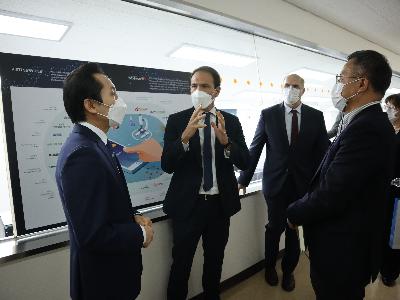
Mr. Cédric O, French Secretary of State for the Digital Transition and Electroni...
Mr. Cedric O, French Secretary of State for the Digital Transition and Electronic Communications visited KISTI - Discussed Cooperation with KISTI in Digital Transition - On Nov. 18th, Mr. Cedric O, Secretary of State for the Digital Transition and Electronic Communications of France has visited Korea Institute of Science and Technology Information(President KIM Jaesoo, hereafter referred to as KISTI) to discuss mutual cooperation of science and technology institutes of both countries in the field of Digital Transition. State Secretary Cedric O has worked as an assistant for digital economy to President Emmanuel Macron since 2017 and took the office of the Secretary of State in charge of digital in 2019. He is currently serving as State Secretary of Digital Transition and Electronic Communications. He has interest in digital transition, electronic information and communication networks, and collaboration with SMEs and showed strong interest in cooperation with Korea in these areas. KISTI is providing national science and technology data platforms such as ScienceON and NTIS, and has the national supercomputer No. 5 Nurion with a performance of 25.7 PetaFlops. As a national science and technology information institution based on such science and technology infrastructure and data, KISTI is contributing to the creation of a national data ecosystem by building a science and technology data dam for the digital new deal as well as domestic and foreign science and technology information. Dr. Kim Jaesoo, President of KISTI while mentioning the cooperation with the French National Institute for Research in Computer Science and Automation (INRIA) and the French Institute of Science and Technology Information (INIST), has emphasized the importance of global cooperation of S&T information organizations of both countries. State Secretary Cedric O also mentioned the need for cooperation and exchange for the sustainable development of the two countries in the digital field based on excellent infrastructure, and proposed to expand coordination at the working level between representative organizations. President Kim Jaesoo said, “The wave of the great digital transition is innovating all structures of our society, and this is spreading all over the world. In this context, we will further strengthen cooperation with French specialized organizations to carry out our mission of being the country's chief scientific and technological data officer (CDO)." -
232021. 09
No. 195 View. 207949
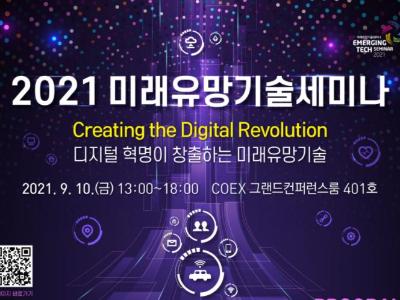
What is the promising technology in the future?
KISTI has hold '2021 Promising Technology Seminar' under the theme of 'The Future Promising Technology Created by the Digital Revolution' at COEX in Seoul on Sep. 10th. In this seminar, promising future technologies derived by analyzing scientific and technological data and successful commercialization cases were presented. Promising technologies for the future include △deep learning △parasitic computing △platform-based community △agile and ragile manufacturing △energy cloud △new carbon material △human-earth symbiosis △on/off mental health △expansion from DNA to RNA △with corona . At the event, △New normal era, how the market responds (CEO Jong-yoon Kim, CEO of Yanolja) △The future of metaverse drawn by SK Telecom (Jeon Jin-soo, SK Telecom Metaverse CO head) △ Subscription Economy that stimulates digital transformation of companies (Jin-hyeok Ahn, Vice President of Kakao) △ Thematic presentations on quantum computing tasks and directions using superconducting qubits (Dr. Hanhee Baek, IBM) were followed. Also, ‘Digital Healthcare Future Strategy’ by Celltrion Exeive Vice President Sooyoung Lee, ‘Strategy and Technology for Carbon Neutrality’ by Inwan Son, Exeive Director of Hanwha Solutions Central Research Institute, ‘Future Technology Discovered in Data’ by Dr. Hyeyoung Yang of KISTI, Dongkyu Won KISTI R&D Investment Strategy Research Center Jang's 'promising fields for government R&D investment' were introduced. Dr. Kim Jae-soo, president of KISTI, said, "Science technology and data analysis help rational and accurate value judgment in the new normal era. "

 Delete Article!
Delete Article!